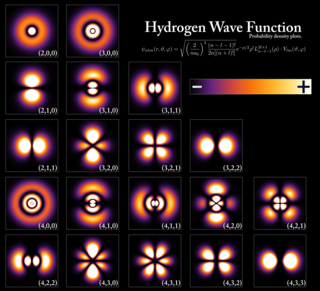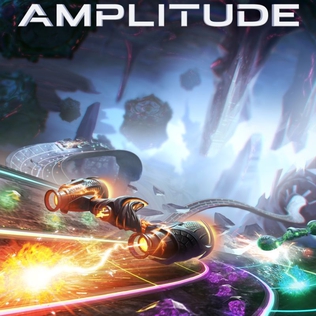Amplitude is a measure of a periodic variable in classical physics.
Contents
Amplitude may also refer to:
| Look up amplitude in Wiktionary, the free dictionary. |
Amplitude is a measure of a periodic variable in classical physics.
Amplitude may also refer to:
| Look up amplitude in Wiktionary, the free dictionary. |
P.S. commonly refers to:
Psi, PSI or Ψ may refer to:

Quantum mechanics is a fundamental theory in physics that provides a description of the physical properties of nature at the scale of atoms and subatomic particles. It is the foundation of all quantum physics including quantum chemistry, quantum field theory, quantum technology, and quantum information science.
Quantum theory may refer to:
Channel, channels, channeling, etc., may refer to:
Beam may refer to:
Swing or swinging may refer to:
NS as an abbreviation can mean:
Ensemble may refer to:
CS, C-S, C.S., Cs, cs, or cs. may refer to:
In physics, action is a numerical value describing how a physical system has changed over time. Action is significant because the equations of motion of the system can be derived through the principle of stationary action. In the simple case of a single particle moving with a specified velocity, the action is the momentum of the particle times the distance it moves, added up along its path, or equivalently, twice its kinetic energy times the length of time for which it has that amount of energy, added up over the period of time under consideration. For more complicated systems, all such quantities are added together. More formally, action is a mathematical functional which takes the trajectory, also called path or history, of the system as its argument and has a real number as its result. Generally, the action takes different values for different paths. Action has dimensions of energy × time or momentum × length, and its SI unit is joule-second.
Anomaly may refer to:

Amplitude is a music video game developed by Harmonix for the PlayStation 2. It is the sequel to Frequency. The game was released in 2003 for North America on March 24 and for Europe on September 26.

Remedy Entertainment Oyj is a Finnish video game developer based in Espoo. Notable games the studio has developed include the first two instalments in the Max Payne franchise, Alan Wake, Quantum Break and Control. Sam Lake, the writer and face model for Max Payne in the original game, has represented the company on numerous occasions.

In theoretical physics, the pilot wave theory, also known as Bohmian mechanics, was the first known example of a hidden-variable theory, presented by Louis de Broglie in 1927. Its more modern version, the de Broglie–Bohm theory, interprets quantum mechanics as a deterministic theory, avoiding troublesome notions such as wave–particle duality, instantaneous wave function collapse, and the paradox of Schrödinger's cat. To solve these problems, the theory is inherently nonlocal.
The quantum potential or quantum potentiality is a central concept of the de Broglie–Bohm formulation of quantum mechanics, introduced by David Bohm in 1952.

007: Quantum of Solace is a 2008 first-person shooter video game based on the films Casino Royale and Quantum of Solace. Developed by Treyarch for PlayStation 3, Xbox 360, Wii and PC, Eurocom for PlayStation 2 and Vicarious Visions for the Nintendo DS, the game was the first James Bond video game to be published by Activision, who gained the Bond licence from EA in 2006. The game was also the first to feature Daniel Craig's voice and likeness, as well as those of Judi Dench, Eva Green, Mads Mikkelsen, Olga Kurylenko and Mathieu Amalric.
Hamilton may refer to:

In general relativity, the Hamilton–Jacobi–Einstein equation (HJEE) or Einstein–Hamilton–Jacobi equation (EHJE) is an equation in the Hamiltonian formulation of geometrodynamics in superspace, cast in the "geometrodynamics era" around the 1960s, by Asher Peres in 1962 and others. It is an attempt to reformulate general relativity in such a way that it resembles quantum theory within a semiclassical approximation, much like the correspondence between quantum mechanics and classical mechanics.

Amplitude is a 2016 music video game developed and published by Harmonix. As the remake of Amplitude (2003), the game was released in 2016 for PlayStation 4 in January and for PlayStation 3 in April. The game received generally average reviews upon release.